|
1. CBS Grudgingly Acknowledges Progress in Iraq, But 'Danger' Ahead
Finally catching up with ABC and NBC, the night before Thanksgiving the CBS Evening News turned to chief foreign correspondent Lara Logan for a look at how conditions are improving in Iraq. But the story from Logan, who just over a month ago insisted that "we're doing extremely badly," was more cynical and foreboding than more upbeat reports aired Thanksgiving night on ABC and NBC when CBS's newscast was bumped for football. Logan began with how "the sounds of celebration echo on the streets of Baghdad's deadly Adamiyah neighborhood for the first time since the U.S. invasion," but in explaining that "the U.S. now fights alongside their old Sunni enemy" she said the U.S. "calls them volunteers" while "some people call them America's militia." Explaining how local Sunni women are helping the U.S., Logan stressed how "it's so dangerous to be seen working for the U.S. that many of these women hide their identity cards." Logan ominously warned: "The U.S. can't keep paying and protecting the Sunni volunteers forever. And if it doesn't transition into the Iraqi police, and the Iraqi government doesn't take it on, that's the danger....A danger that could send the Sunnis back to war, this time with nothing left to lose."
2. Brokaw: War Critics Assumed WMD in Iraq, Too Much PC in Race Talk
During a pre-taped appearance on CNN's Reliable Sources on Sunday, former NBC News anchor Tom Brokaw pointed out that before the invasion of Iraq, even "people who were critical of the war" thought that Saddam Hussein "had weapons of mass destruction," as he responded to criticism that the media were not aggressive enough about challenging President Bush before the Iraq invasion. And while commenting on racial issues, giving his view that "we need to have a dialogue in this country" about race, Brokaw lamented the problems posed by "political correctness" which means "you're in danger of being a racist if you go against the merits of some issues and just try to look at it objectively." Brokaw added: "Within the black culture, there's a fear about speaking out, about what some people see as wrong, because they say, don't go there, you know, it will only hurt our people."
3. CNN: Will Rudy Be 'Swiftboated' with 'Unsubstantiated Attacks'?
A report on Tuesday's The Situation Room on CNN, which highlighted the anti-Giuliani campaign of some family members of firefighters killed on 9/11, also tried to throw some retrospective doubt on the "Swift Boat Veterans for Truth" which opposed John Kerry in 2004. CNN correspondent Deborah Feyerick proposed the following question about the campaign: "Is this another 'Swift Boat' situation, in which unsubstantiated attacks against John Kerry's service in Vietnam, scuttled his presidential candidacy. These families say no." In addition to this question, CNN played two soundbites, one from Sally Reganhard, a prominent member of this campaign, and the other from a Baruch College professor, which reenforced the "unsubstantiated" label used by CNN. Reganhard indirectly accused the "Swift Boat" veterans of using lies: "The difference between the 'Swift Boating' and this is that everything that we are saying is the truth." Also, a chyron during the report proclaimed that "9/11 Families Challenge Giuliani: Efforts Compared to 'Swiftboating.'"
4. Olbermann: 'Race Hatred' from FNC and 'Stupid' Kellyanne Conway
On Wednesday's Countdown, MSNBC host Keith Olbermann accused Republican strategist Kellyanne Conway and Fox News of "race hatred" in response to Conway making an arguably alarmist suggestion on Monday's The O'Reilly Factor that allowing the EEOC to sue employers for requiring its employees to speak English on the job could eventually lead to the hiring of non-English-speaking employees for other more serious jobs like air traffic controllers, resulting in airplanes crashing. During the Countdown show's regular "Worst Person in the World" segment, the MSNBC host went over the top by charging that Conway was "trying to dress up the lunatic fringe's race hatred over there at Fox News," and, addressing Conway, advised: "If you were just honest about your racism, at least you wouldn't look quite that stupid."
 CBS Grudgingly Acknowledges Progress CBS Grudgingly Acknowledges Progress
in Iraq, But 'Danger' Ahead
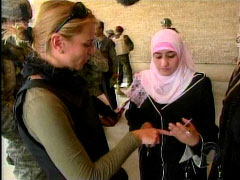 Finally catching up with ABC and NBC, the night before Thanksgiving the CBS Evening News turned to chief foreign correspondent Lara Logan for a look at how conditions are improving in Iraq. But the story from Logan, who just over a month ago insisted that "we're doing extremely badly," was more cynical and foreboding than more upbeat reports aired Thanksgiving night on ABC and NBC when CBS's newscast was bumped for football.
Finally catching up with ABC and NBC, the night before Thanksgiving the CBS Evening News turned to chief foreign correspondent Lara Logan for a look at how conditions are improving in Iraq. But the story from Logan, who just over a month ago insisted that "we're doing extremely badly," was more cynical and foreboding than more upbeat reports aired Thanksgiving night on ABC and NBC when CBS's newscast was bumped for football.
Fill-in anchor Russ Mitchell noted "some signs perhaps that conditions are improving. Nationwide, the U.S. military says terror attacks have fallen 55 percent since the summer." Logan began with how "the sounds of celebration echo on the streets of Baghdad's deadly Adamiyah neighborhood for the first time since the U.S. invasion," but in explaining that "the U.S. now fights alongside their old Sunni enemy" she said the U.S. "calls them volunteers" while "some people call them America's militia." Explaining how local Sunni women are helping the U.S., Logan stressed how "it's so dangerous to be seen working for the U.S. that many of these women hide their identity cards." Logan ominously warned: "The U.S. can't keep paying and protecting the Sunni volunteers forever. And if it doesn't transition into the Iraqi police, and the Iraqi government doesn't take it on, that's the danger....A danger that could send the Sunnis back to war, this time with nothing left to lose."
The next night, on the Thanksgiving holiday, ABC fill-in anchor David Muir reported that "optimism is spreading" among American troops. Passing on to viewers that "overall levels of violence have gone way down," correspondent Terry McCarthy cited "cautious optimism" from U.S. commanders in Iraq and relayed that "many commanders on the ground now believe they're winning." McCarthy also bolstered the credibility of one of his primary sources for this newfound optimism, Lieutenant General Raymond Odierno, as having a history of being a "straight shooter" who "calls it as he sees it," in contrast with "others in the top brass sounding optimistic before," as McCarthy concurred with Muir's assessment that Odierno "hasn't always been this optimistic." McCarthy concluded: "Unlike some of the other top brass, General Odierno is a fairly straight shooter and calls it as he sees it. And I think it's very significant that today, even though he's not declaring victory in this war, he clearly thinks they're starting to win."
On Thursday's NBC Nightly News, substitute host David Gregory contended that Thanksgiving provides "an opportunity for American commanders to tout the effectiveness of the surge strategy," while correspondent Tom Aspell passed on news of a "sharp drop in attacks against coalition forces." Citing security improvements on Baghdad's Haifa Street, Aspell contended that "for [Colonel Brian] Roberts and his soldiers, reclaiming Haifa Street has been a mission to be proud of, and a memory to share next Thanksgiving when they are home with their families."
[This item was posted Monday morning on the MRC's blog, NewsBusters.org: newsbusters.org ]
The CyberAlert account, posted with video, of Logan's dire assessment a month ago:
 Asked by Jay Leno on Monday's [October 15] Tonight Show "how are we doing" in Iraq?, CBS News chief foreign correspondent Lara Logan asserted that "we're doing extremely badly" and proceeded to fret, that since images of dead American soldiers are "hidden," the public does not realize the situation is "much worse than the picture, the image we even have of Iraq." As for the impact of the "surge," Logan, who reports regularly from Iraq, allowed that it is "working in certain places," but only "temporarily" because "if you haven't altered the fundamental dynamics" then you "still have the same problem." Asked by Jay Leno on Monday's [October 15] Tonight Show "how are we doing" in Iraq?, CBS News chief foreign correspondent Lara Logan asserted that "we're doing extremely badly" and proceeded to fret, that since images of dead American soldiers are "hidden," the public does not realize the situation is "much worse than the picture, the image we even have of Iraq." As for the impact of the "surge," Logan, who reports regularly from Iraq, allowed that it is "working in certain places," but only "temporarily" because "if you haven't altered the fundamental dynamics" then you "still have the same problem."
Logan's full answer to Leno's question about how the U.S. is doing in Iraq: "We're doing extremely badly, from my point of view. I was asked if I felt any guilt for the fact that the world has an impression of the war in Iraq as being very bad and going very wrong? And I said I really don't because I can't imagine the last time anyone saw a dead American soldier. We've hidden that from view. Nobody knows what that looks like and I've seen plenty of it. It's much worse than the picture, the image we even have of Iraq."
For the full item with video: www.mrc.org
A November 15 CyberAlert item, "NBC Catches Up With ABC to Highlight Safer, Better Life in Iraq," recounted:
Three weeks after ABC's World News aired the first of three stories then and since about significant declines in violence and improving living conditions in Iraq, NBC Nightly News caught up Wednesday night as anchor Brian Williams acknowledged: "We are all hearing more and more these days about a significant drop in violence and deaths in Iraq, even though 2007 some time ago became the bloodiest year of the war, yet for U.S. forces these new stats show a different trend."
From Iraq, reporter Tom Aspell illustrated how life has improved: "A few months ago, Ali Hamid could not have sold balloons here on Jadriyah Street. He might have been kidnaped or killed. A few blocks away, Azar Habud might have been shot for giving Western-style haircuts in his barbershop. And nearby, Mohammed Hassan's ice cream shop is still busy, even though it was bombed twice in April, killing nine customers. Back then, explosions were a horrifying part of everyday life. Now, the U.S. military says rocket and mortar attacks in Iraq have dropped sharply in the last few months from 1,000 in June to fewer than 400 in October. And so have civilian deaths."
For the entire article: www.mrc.org
Previous NewsBusters postings on how, until NBC's piece, ABC's World News had been the only broadcast network evening newscast airing reports from Iraq on improving conditions:
October 23 CyberAlert: "ABC Airs Upbeat Iraq Story on Fallujah's 'Remarkable Turnaround.'" See: www.mrc.org
October 31 CyberAlert: "ABC: Iraqis Adapt to 'New Normal' as 'Violence on Downward Trend.'" See: www.mrc.org
November 2 CyberAlert: "Only ABC Reports Military's Stats on Violence Plunging in Iraq." See: www.mrc.org
Now, transcripts of the November 21 CBS Evening News story followed, by the November 22 pieces on ABC and NBC, as provided by the MRC's Brad Wilmouth who also helped draft this posting:
# CBS Evening News:
RUSS MITCHELL: In Iraq, some signs perhaps that conditions are improving. Nationwide, the U.S. military says terror attacks have fallen 55 percent since the summer. And the Baghdad government said today some 1600 refugees are now returning to Iraq each day as the U.S. and former enemies team up to fight the terrorists. It is a trend that's being celebrated in one Baghdad neighborhood, as Lara Logan reports.
LARA LOGAN: The sounds of celebration echo on the streets of Baghdad's deadly Adamiyah neighborhood for the first time since the U.S. invasion. Former Sunni insurgents, today America's greatest allies in defeating al-Qaeda in Iraq, enjoy a recent victory that left eight suspected terrorists dead. The U.S. now fights alongside their old Sunni enemy and calls them volunteers. Some people call them America's militia.
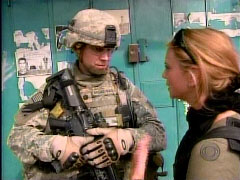 LIEUTENANT COLONEL JEFFEREY BROADWATER, U.S. ARMY: It's not a militia. There's a big difference. These guys are under contract, they've been trained by the Iraqi government. LIEUTENANT COLONEL JEFFEREY BROADWATER, U.S. ARMY: It's not a militia. There's a big difference. These guys are under contract, they've been trained by the Iraqi government.
LOGAN: A U.S. contract that includes a highly unusual weapon -- local Sunni women, some 52 of them in Adamiyah, paid with American tax dollars to protect the schools, hospitals and anything else the neighborhood needs. You're trained to use an AK-47?
WOMAN: Yeah, yeah.
LOGAN: But it's so dangerous to be seen working for the U.S. that many of these women hide their identity cards. Their greatest fear is losing their lives and their jobs when the U.S. pulls out. You don't believe the Iraqi government will pay you?
WOMAN: No. They hate us. They hate us.
LOGAN: They hate you?
WOMAN: Yeah.
LOGAN: The Shiite-dominated Iraqi government hasn't been as eager as the U.S. to embrace their former Sunni enemies in spite of significant successes. This mass of hidden weapons came from only two of 14 caches the volunteers uncovered in Adamiyah in the past two weeks. Only a month ago, this bustling main street was completely deserted. Now, even the only gas station, closed for two years, has been re-opened by U.S. troops. But the U.S. can't keep paying and protecting the Sunni volunteers forever. And if it doesn't transition into the Iraqi police, and the Iraqi government doesn't take it on, that's the danger.
LT. COL. BROADWATER: That, you're absolutely right. That is a huge danger.
LOGAN: A danger that could send the Sunnis back to war, this time with nothing left to lose. Lara Logan, CBS News, Adamiyah, Iraq.
# ABC's World News, November 22:
 DAVID MUIR: Good evening and Happy Thanksgiving. American troops are spending their fifth Thanksgiving at war in Iraq. Last year on this day, Baghdad was in lockdown after one of that city's deadliest suicide bombings. But the headlines in recent weeks have been different. And today, our Baghdad correspondent, Terry McCarthy, got an extraordinary look at the country, traveling with the number two U.S. General there, Ray Odierno. They made nine stops, visiting several communities that have been notorious for violence. And as Terry reports, the optimism, among Americans at least, is spreading.
DAVID MUIR: Good evening and Happy Thanksgiving. American troops are spending their fifth Thanksgiving at war in Iraq. Last year on this day, Baghdad was in lockdown after one of that city's deadliest suicide bombings. But the headlines in recent weeks have been different. And today, our Baghdad correspondent, Terry McCarthy, got an extraordinary look at the country, traveling with the number two U.S. General there, Ray Odierno. They made nine stops, visiting several communities that have been notorious for violence. And as Terry reports, the optimism, among Americans at least, is spreading.
TERRY MCCARTHY: From the triangle of death south of Baghdad, to the killing fields of Diyala to the north, to the once deadly deserts of Anbar out west, everywhere we went today, we heard the same thing: Violence is going down. No one is happier than General Odierno, one of the main designers of the U.S. troop surge in Iraq.
LIEUTENANT GENERAL RAYMOND ODIERNO, U.S. ARMY: Happy Thanksgiving to you. I like that smile.
MCCARTHY: The general has a lot to thank his troops for.
ODIERNO: I think we've created, again, a window. I think we can be successful here.
 MCCARTHY: We have heard others in the top brass sounding optimistic before, but Odierno is not given to hype. And what was even more remarkable about today's trip was how many commanders on the ground now believe they're winning. MCCARTHY: We have heard others in the top brass sounding optimistic before, but Odierno is not given to hype. And what was even more remarkable about today's trip was how many commanders on the ground now believe they're winning.
LIEUTENANT COLONEL JOHN KOLASHESKI, U.S. ARMY: And we are cautiously optimistic the direction that we're headed, but it's, you know, we're, we're not where we need to be yet.
UNIDENTIFIED MALE SOLDIER: It's a positive trend right now.
MCCARTHY: The biggest change, local citizens abandoning the insurgency and helping the Americans. Already, the U.S. has signed up 72,000 men to serve as community police. The message we get from U.S. commanders in bases outside Baghdad is pretty much the same wherever we go, cautious optimism. Not only is there a huge increase in Iraqi citizens groups who are coming forward to help the Americans, but overall levels of violence have gone way down. When the surge started, three or four Americans were being killed every day in Iraq. Now that number has gone down to about one a day. And for Iraqis, reason to be thankful, as well. Civilian deaths in Baghdad are down 65 percent compared to six months ago. Car bombs are down 47 percent. It's important to remember the war is far from over here. Just today, 11 Iraqis were killed in a single attack in southern Baghdad. David?
MUIR: And, Terry, I know a lot of people would expect this kind of optimism from General Odierno, one of the architects of the surge, but you've spent a lot of time with him. He hasn't always been this optimistic.
MCCARTHY: That's right, David. Unlike some of the other top brass, General Odierno is a fairly straight shooter and calls it as he sees it. And I think it's very significant that today, even though he's not declaring victory in this war, he clearly thinks they're starting to win.
# NBC Nightly News, November 22:
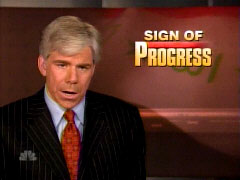 DAVID GREGORY: In Iraq, Thanksgiving is an opportunity for American commanders to tout the effectiveness of the surge strategy and begin to suggest that Iraqis might be re-thinking what is possible in that country. Tonight NBC's Tom Aspell joins us from Baghdad with the view from the Green Zone and a street that was known as one of the most dangerous. Tom?
DAVID GREGORY: In Iraq, Thanksgiving is an opportunity for American commanders to tout the effectiveness of the surge strategy and begin to suggest that Iraqis might be re-thinking what is possible in that country. Tonight NBC's Tom Aspell joins us from Baghdad with the view from the Green Zone and a street that was known as one of the most dangerous. Tom?
TOM ASPELL: David, today the U.S. military said there has been a sharp drop in attacks against coalition forces in the last 21 weeks. So today's holiday was almost a celebration. For American soldiers in the war zone far from home, a special day. At Camp Prosperity in Baghdad, Second Brigade First Cavalry, a chance to relax a little with flag football and then move inside for the main event.
COLONEL BRIAN ROBERTS: Come on over here. Let me serve you for a change.
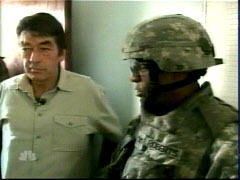 ASPELL: And a chance for Colonel Brian Roberts to show his appreciation to his men, who fought 13 months in some of Baghdad's toughest areas, including the notorious Haifa Street. Until January, al-Qaeda owned it, launching 80 attacks against U.S. forces and murdering 53 Iraqis. Then Cav soldiers and Iraqi army units started fighting back. The fierce street battles went on for 40 days. Major Chris Nouri won a Bronze Star for bravery. ASPELL: And a chance for Colonel Brian Roberts to show his appreciation to his men, who fought 13 months in some of Baghdad's toughest areas, including the notorious Haifa Street. Until January, al-Qaeda owned it, launching 80 attacks against U.S. forces and murdering 53 Iraqis. Then Cav soldiers and Iraqi army units started fighting back. The fierce street battles went on for 40 days. Major Chris Nouri won a Bronze Star for bravery.
MAJOR CHRIS NOURI: You'd go out and you'd conduct an operation and you'd think, 'Boy, we got it. We got these guys. They're on the ropes.' The very next day, you'd be at it again and again, day after day.
ASPELL: When the fighting ended, Colonel Roberts and his men spent three months going door to door, making friends with frightened residents and reopening schools.
ROBERTS: They got sewer, water, electricity. Looks like, you know, there's some type of trash service here routinely.
ASPELL: Today we see traffic jams where al-Qaeda once saw targets.
ROBERTS: We wouldn't be standing here a year ago. No ifs, ands or buts about it.
ASPELL: In the market, now crowded with shoppers and filled with fresh produce, 60-year-old Daoud Salman is an old friend.
ROBERTS: You are somebody to always look for when I-
ASPELL: The locals call Roberts the godfather because he protects them and gives them jobs. With loans of a few hundred dollars, he's helped kickstart much-needed business.
ROBERTS: There's some beautiful pieces here.
ASPELL: For Roberts and his soldiers, reclaiming Haifa Street has been a mission to be proud of, and a memory to share next Thanksgiving when they are home with their families. A volley of mortar shells hit the Green Zone just minutes after we left this afternoon. The military says there were no coalition casualties, but the attack was a reminder that this fight is far from over.
  Brokaw: War Critics Assumed WMD in Iraq, Brokaw: War Critics Assumed WMD in Iraq,
Too Much PC in Race Talk
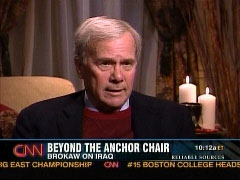 During a pre-taped appearance on CNN's Reliable Sources on Sunday, former NBC News anchor Tom Brokaw pointed out that before the invasion of Iraq, even "people who were critical of the war" thought that Saddam Hussein "had weapons of mass destruction," as he responded to criticism that the media were not aggressive enough about challenging President Bush before the Iraq invasion. And while commenting on racial issues, giving his view that "we need to have a dialogue in this country" about race, Brokaw lamented the problems posed by "political correctness" which means "you're in danger of being a racist if you go against the merits of some issues and just try to look at it objectively." Brokaw added: "Within the black culture, there's a fear about speaking out, about what some people see as wrong, because they say, don't go there, you know, it will only hurt our people."
During a pre-taped appearance on CNN's Reliable Sources on Sunday, former NBC News anchor Tom Brokaw pointed out that before the invasion of Iraq, even "people who were critical of the war" thought that Saddam Hussein "had weapons of mass destruction," as he responded to criticism that the media were not aggressive enough about challenging President Bush before the Iraq invasion. And while commenting on racial issues, giving his view that "we need to have a dialogue in this country" about race, Brokaw lamented the problems posed by "political correctness" which means "you're in danger of being a racist if you go against the merits of some issues and just try to look at it objectively." Brokaw added: "Within the black culture, there's a fear about speaking out, about what some people see as wrong, because they say, don't go there, you know, it will only hurt our people."
[This item, by Brad Wilmouth, was posted late Sunday night on the MRC's blog, NewsBusters.org: newsbusters.org ]
After a discussion of Brokaw's views on the Vietnam War, during which Brokaw recounted that he was "enraged" upon hearing tapes of Lyndon Johnson expressing "deep doubts" about the war even while the former President "kept pouring people in" as "he was protecting his political ass," CNN host Howard Kurtz turned the subject to the Iraq War. Kurtz: "In terms of the coverage, do you see certain parallels here to Iraq? Most people would say, and I would agree, that the media did a pretty poor job during the run-up to the Iraq War in terms of the way that President Bush was selling it, and now, of course, the coverage in recent years has been more critical."
Brokaw defended the media's coverage of the run-up to the invasion, pointing out that most skeptics believed at the time that Iraq had WMD, and contending that there was little opposition to the war expressed within the Democratic Party at the time. Brokaw: "The one thing I would disagree with you about, a lot of what happened on the run-up was unknowable. People did believe he had weapons of mass destruction. People who were critical of the war and the idea of going to war did, in fact, think that he had weapons of mass destruction, which was one of the bases for-"
After conceding to Kurtz his view that "on the war plan [the media] should have been a lot more skeptical," Brokaw continued: "Yeah, but you have to remember the opposition voices were not that many in this town, for example, in Washington. There just weren't that many. We put Brent Scowcroft on 'Nightly News.' I did a two-way with him. And I was one of the few places where he would go where he would do that. We did have Senator Bob Byrd on the air and Ted Kennedy on the air, but it passed by a pretty considerable margin."
Regarding the current news of the diminishing violence in Iraq, Brokaw acknowledged that for the media, "it's time to take a look at it again," and that the media should "take notice of the fact that the attacks are down," but he also poured water on the positive news by contending that "these are small signs of some progress four years later," and that recent developments "won't solve the political issue about whether Iraq can handle its own destiny."
Later on, after Kurtz brought up the controversy over Don Imus making racist comments about the Rutgers women's basketball team, Brokaw recounted that he had hoped something positive would come out of the affair in the form of a "dialogue in this country" about race. He contended that in general there is too much "political correctness" and "danger of being [called] a racist" when expressing disagreement on a racial issue. Brokaw: "I think that we do need to have a dialogue in this country. We don't have language for dealing with race. Everybody hides behind political correctness or a certain mythology. No one wants to offend, no one wants to get at the facts of it. You're in danger of being a racist if you go against the merits of some issues and just try to look at it objectively. That goes on across the racial spectrum, by the way. Within the black culture, there's a fear about speaking out, about what some people see as wrong, because they say, don't go there, you know, it will only hurt our people. So I do, we used to talk about race with a lot more candor than we do now."
Below is a transcript of relevant portions of the Sunday, November 25 Reliable Sources on CNN:
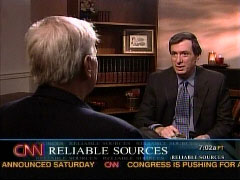 HOWARD KURTZ: Vietnam, one of your friends from the University of South Dakota went there, did not come back. You write that you were disillusioned with the deceptions of Johnson and Nixon. Talk a little bit about that.
HOWARD KURTZ: Vietnam, one of your friends from the University of South Dakota went there, did not come back. You write that you were disillusioned with the deceptions of Johnson and Nixon. Talk a little bit about that.
TOM BROKAW: Well, Johnson tapes just enraged me when I read them later, the private conversations he was having very early on with Richard Russell.
KURTZ: His own doubts about the war that he was prosecuting.
BROKAW: His own deep doubts about the war. And the man that he really counted on in the Senate to be his military affairs expert, Richard Russell, said he just doesn't believe that this makes any sense at all, that he at one point says it will all be settled with missiles if it's settled at all. And, but Johnson keeps pouring people in. He was terrified, obviously, the political effect that it might have if the right would come after him. He even talks in one exchange about impeachment. He was protecting his political ass, excuse my language, but that's what he was doing while young people were dying over there.
BROKAW: Nixon made more of an effort to try to find peace in Vietnam. He did make several overtures to the north. But he kept pouring people in there as well because he believed he was the last person who should lose a war and that he thought it was important to stand up to the communists. He came into office if not actually saying, "I have a secret plan for making peace"-
KURTZ: Right.
BROKAW: -giving the impression that he could bring the war to an end.
KURTZ: In terms of the coverage, do you see certain parallels here to Iraq? Most people would say, and I would agree, that the media did a pretty poor job during the run-up to the Iraq War in terms of the way that President Bush was selling it, and now, of course, the coverage in recent years has been more critical.
BROKAW: Yeah, the one thing I would disagree with you about, a lot of what happened on the run-up was unknowable. People did believe he had weapons of mass destruction. People who were critical of the war and the idea of going to war did, in fact, think that he had weapons of mass destruction, which was one of the bases for-
KURTZ: But shouldn't journalists have been more skeptical toward the line the administration was selling, even if they couldn't disprove it-
BROKAW: I think on the war plan they should have been a lot more skeptical.
KURTZ: And given more space, more air time to opposition voices? There was a feeling-
BROKAW: Yeah, but you have to remember the opposition voices were not that many in this town, for example, in Washington. There just weren't that many. We put Brent Scowcroft on "Nightly News." I did a two-way with him. And I was one of the few places where he would go where he would do that. We did have Senator Bob Byrd on the air and Ted Kennedy on the air, but it passed by a pretty considerable margin.
KURTZ: Oh, within the Democratic Party there weren't that many anti-war voices.
BROKAW: Yeah, that's right.
KURTZ: There were some outside. In recent months, though, casualties are down in Iraq. Some would say that the surge is having some modest success. Yet conservatives say that's not getting enough coverage. Is that because of Iraq fatigue? Is that because only bad news is news?
BROKAW: No, I think it's time to take a look at it again. You know what, Howie? These are small signs of some progress four years later.
KURTZ: Sure.
BROKAW: And the Iraqi government still doesn't have it together. And after four years, if the Iraqis can't take care of themselves with all of the money that has been poured in there, all of the help that they've been given, that's a truer measurement, I think, of what's going on in Iraq. It does not mean that we ought not to take notice of the fact that the attacks are down, that the insurgency has been hurt. I had a briefing the other day about what's going on with IEDs. After billions of dollars, we have finally found a way to be more effective at protecting our troops from them and detonating them early. But it's taken a long time. That won't solve the political issue about whether Iraq can handle its own destiny.
...
KURTZ: Don Imus comes up in your book. He goes back on the air, on the radio, next week. You told him when he was going though his difficult time after the insult of the Rutgers women's basketball players and when CBS Radio dumped him and MSNBC dumped him as well that you hoped that what he was going through, painful as it was, would lead to an elevated racial dialogue in the country. What did he say to you?
BROKAW: He said, "Call me at the ranch when that happens," because he didn't expect it to happen, and he was right. It hasn't happened. And it's one of the things that I address directly in the book. I think that we do need to have a dialogue in this country. We don't have language for dealing with race. Everybody hides behind political correctness or a certain mythology. No one wants to offend, no one wants to get at the facts of it. You're in danger of being a racist if you go against the merits of some issues and just try to look at it objectively. That goes on across the racial spectrum, by the way. Within the black culture, there's a fear about speaking out, about what some people see as wrong, because they say, don't go there, you know, it will only hurt our people. So I do, we used to talk about race with a lot more candor than we do now.
KURTZ: Do you think that Imus can make a successful comeback? And would you go back on the show?
BROKAW: You know, what I've said is that, let's hear what he has to say. I think we owe him that. I believe in redemption. I think Don's a very smart guy. I know that that meeting that he had with the students from Rutgers, with the basketball players, was one of the most important moments in his life, a deeply emotional and moving time, I think, for both parties. So let's hear what he has to say.
  CNN: Will Rudy Be 'Swiftboated' with CNN: Will Rudy Be 'Swiftboated' with
'Unsubstantiated Attacks'?
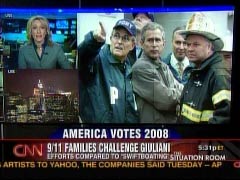 A report on Tuesday's The Situation Room on CNN, which highlighted the anti-Giuliani campaign of some family members of firefighters killed on 9/11, also tried to throw some retrospective doubt on the "Swift Boat Veterans for Truth" which opposed John Kerry in 2004. CNN correspondent Deborah Feyerick proposed the following question about the campaign: "Is this another 'Swift Boat' situation, in which unsubstantiated attacks against John Kerry's service in Vietnam, scuttled his presidential candidacy. These families say no."
A report on Tuesday's The Situation Room on CNN, which highlighted the anti-Giuliani campaign of some family members of firefighters killed on 9/11, also tried to throw some retrospective doubt on the "Swift Boat Veterans for Truth" which opposed John Kerry in 2004. CNN correspondent Deborah Feyerick proposed the following question about the campaign: "Is this another 'Swift Boat' situation, in which unsubstantiated attacks against John Kerry's service in Vietnam, scuttled his presidential candidacy. These families say no."
In addition to this question, CNN played two soundbites, one from Sally Reganhard, a prominent member of this campaign, and the other from a Baruch College professor, which reenforced the "unsubstantiated" label used by CNN. Reganhard indirectly accused the "Swift Boat" veterans of using lies: "The difference between the 'Swift Boating' and this is that everything that we are saying is the truth." Also, a chyron during the report proclaimed that "9/11 Families Challenge Giuliani: Efforts Compared to 'Swiftboating.'"
[This item, by Matthew Balan, was posted Wednesday afternoon on the MRC's blog, NewsBusters.org: newsbusters.org ]
Host Wolf Blitzer introduced the report, which aired at the bottom of the 5pm EST hour, by immediately bringing up the "Swift Boat" comparison: "It's the cornerstone of Rudy Giuliani's presidential campaign, the 9/11 terror attacks. But now, an unlikely group is trying to undermine that with an effort that some are comparing to the 'Swift Boat' campaign against John Kerry." Neither Blitzer nor Feyerick mention who is making this comparison.
CNN did note the campaign's connection to the International Association of Firefighters, a union who endorsed John Kerry in 2004. As Feyerick put it, "over the summer, these firefighter families appeared in a scathing anti-Giuliani video made by the International Association of Firefighters." The union's president, Harold A. Schaitberger, started a close relationship with Kerry early during his 2004 campaign. In August 2007, a CNN report quoted Kerry as saying, "I still keep a picture at home of Harold Schaitberger...standing by my side the night we won the New Hampshire primary."
For CNN'S report mentioning Schaitberger's relationship with Kerry: politicalticker.blogs.cnn.com
Immediately after the three-minute report, Blitzer conducted a four-and-a-half minute interview of Jim Riches, a deputy chief for the Fire Department of New York City who is a member of the family members' campaign against Giuliani. After a commercial break, Blitzer then interviewed Howard Safir, a former NYC fire and police commissioner and Giuliani supporter who accused the members of the campaign of "turning the terrorist attacks of September 11th into a political football."
The full transcript of the report from the November 20 The Situation Room:
WOLF BLITZER: It's the cornerstone of Rudy Giuliani's presidential campaign, the 9/11 terror attacks. But now, an unlikely group is trying to undermine that with an effort that some are comparing to the 'Swift Boat' campaign against John Kerry. CNN's Deborah Feyerick is joining us now. She's watching all this unfold. So, who's challenging, Deb, Rudy Giuliani's 9/11 credentials?
DEBORAH FEYERICK, CNN CORRESPONDENT: Well, Wolf, this is not a new group. In fact, the faces, to many New Yorkers, are familiar. These are people who have repeatedly criticized Rudy Giuliani's handling of 9/11 and all the events before and after that day. The big question - can this small group gain momentum and, if so, what does that mean to the mayor's candidacy? This is the image many Americans have of Rudy Giuliani -- the New York City mayor covered in dust moments after the World Trade Center towers collapsed. It is an image he has evoked in his run for the White House to spotlight his leadership on that tragic day. But Sally Regenhard and others are challenging that image.
SALLY REGENHARD, MOTHER OF 9/11 FIREFIGHTER: Rudy Giuliani is no hero of 9/11.
FEYERICK: Regenhard's son was one of 343 New York City firefighters to die when the towers fell. She is part of a small, determined group of firefighter families taking on the former mayor.
REGENHARD: We want to give people the opportunity to hear the true story and to make their own decisions.
FEYERICK: On Monday, the group traveled to New Hampshire, a crucial state where Mr. Giuliani recently began running these ads.
RUDY GIULIANI: I believe I have been tested in a way in which the American people can look to me. They're not going to find perfection, but they're going to find somebody who's dealt with crisis.
FEYERICK: The families told a handful of people about some of the fire department radios that didn't work on 9/11, about the emergency command center to coordinate a response that, instead, literally collapsed, and about the lack of respirators provided to firefighters searching for colleagues in the toxic rubble. Political scientist, Doug Muzzio says these issues are not new, at least not to New Yorkers.
DOUG MUZZIO, BARUCH COLLEGE: There is a lot of hyperbole in what Rudy Giuliani says about what he did prior to 9/11, on 9/11, and after 9/11. But the kernel of truth is that Rudy Giuliani had his finest hour on 9/11.
FEYERICK: The Giuliani campaign cited news reports praising Giuliani's efforts on behalf of firefighters, and touting the city's preparedness. A former fire commissioner, speaking on Giuliani's behalf, accused Regenhard's group of quote, 'turning the terrorist attacks of September 11th into a political football.' The question now -- is this another 'Swift Boat' situation, in which unsubstantiated attacks against John Kerry's service in Vietnam, scuttled his presidential candidacy. These families say no.
REGENHARD: The difference between the 'Swift Boating' and this is that everything that we are saying is the truth.
FEYERICK: Now, over the summer, these firefighter families appeared in a scathing anti-Giuliani video made by the International Association of Firefighters. Giuliani's representative called the group highly partisan. It is endorsing Democrat Chris Dodd, but says it was not part of this particular New Hampshire trip. Still, that firefighters' union is meeting after Thanksgiving to consider a much larger campaign against the former mayor. Wolf?
BLITZER: Deb Feyerick in New York, thanks very much.
  Olbermann: 'Race Hatred' from FNC and Olbermann: 'Race Hatred' from FNC and
'Stupid' Kellyanne Conway
 On Wednesday's Countdown, MSNBC host Keith Olbermann accused Republican strategist Kellyanne Conway and Fox News of "race hatred" in response to Conway making an arguably alarmist suggestion on Monday's The O'Reilly Factor that allowing the EEOC to sue employers for requiring its employees to speak English on the job could eventually lead to the hiring of non-English-speaking employees for other more serious jobs like air traffic controllers, resulting in airplanes crashing. During the Countdown show's regular "Worst Person in the World" segment, the MSNBC host went over the top by charging that Conway was "trying to dress up the lunatic fringe's race hatred over there at Fox News," and, addressing Conway, advised: "If you were just honest about your racism, at least you wouldn't look quite that stupid."
On Wednesday's Countdown, MSNBC host Keith Olbermann accused Republican strategist Kellyanne Conway and Fox News of "race hatred" in response to Conway making an arguably alarmist suggestion on Monday's The O'Reilly Factor that allowing the EEOC to sue employers for requiring its employees to speak English on the job could eventually lead to the hiring of non-English-speaking employees for other more serious jobs like air traffic controllers, resulting in airplanes crashing. During the Countdown show's regular "Worst Person in the World" segment, the MSNBC host went over the top by charging that Conway was "trying to dress up the lunatic fringe's race hatred over there at Fox News," and, addressing Conway, advised: "If you were just honest about your racism, at least you wouldn't look quite that stupid."
Olbermann's "Worst Person" segment, which normally features the MSNBC host listing three nominees for the dishonor of "Worst Person in the World," started with the Countdown host awarding the third place, or "bronze," distinction to Conway: "The bronze, to Republican water-carrier Kellyanne Conway, trying to dress up the lunatic fringe's race hatred over there at Fox News, claiming that a lawsuit against the Salvation Army branch that fired two employees who would not observe the 'speak only English' rule, could some day lead to death and destruction."
[This item, by Brad Wilmouth, was posted Saturday on the MRC's blog, NewsBusters.org: newsbusters.org ]
Olbermann then read a quote from her, which he likely obtained from the left-wing Media Matters for America, a frequent source of material for the MSNBC host. Imitating Conway's voice, Olbermann read: "'It is,' she says, 'one day going to blossom into two air traffic controllers who don't speak great English because political correctness has made us appoint them to those positions. We're going to have two planes crashing in the sky. And that's not a dramatic example. That's what happens with slippery slopes.'"
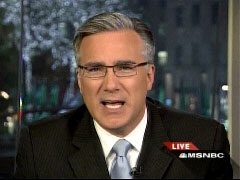 Olbermann contended that the Civil Rights Act would allow employers to require English be spoken if it is "essential to doing the job," and then accused Conway of "racism" and of being "stupid." Olbermann: "Yeah, except the Civil Rights Act on this 'speak only English' stuff specifically excludes workplaces where speaking only English is essential to doing the job. You know, like American air traffic control centers. If you were just honest about your racism, at least you wouldn't look quite that stupid."
Olbermann contended that the Civil Rights Act would allow employers to require English be spoken if it is "essential to doing the job," and then accused Conway of "racism" and of being "stupid." Olbermann: "Yeah, except the Civil Rights Act on this 'speak only English' stuff specifically excludes workplaces where speaking only English is essential to doing the job. You know, like American air traffic control centers. If you were just honest about your racism, at least you wouldn't look quite that stupid."
Below is a transcript of the relevant portion of the Wednesday November 19 "Countdown" show on MSNBC:
But first, time for Countdown's "Worst Persons in the World." The bronze, to Republican water-carrier Kellyanne Conway, trying to dress up the lunatic fringe's race hatred over there at Fox News, claiming that a lawsuit against the Salvation Army branch that fired two employees who would not observe the "speak only English" rule, could some day lead to death and destruction. "It is," she says, "one day going to blossom into two air traffic controllers who don't speak great English because political correctness has made us appoint them to those positions. We're going to have two planes crashing in the sky. And that's not a dramatic example. That's what happens with slippery slopes."
Yeah, except the Civil Rights Act on this "speak only English" stuff specifically excludes workplaces where speaking only English is essential to doing the job. You know, like American air traffic control centers. If you were just honest about your racism, at least you wouldn't look quite that stupid.
-- Brent Baker

Home | News Division
| Bozell Columns | CyberAlerts
Media Reality Check | Notable Quotables | Contact
the MRC | Subscribe
|





















 Finally catching up with ABC and NBC, the night before Thanksgiving the CBS Evening News turned to chief foreign correspondent Lara Logan for a look at how conditions are improving in Iraq. But the story from Logan, who just over a month ago insisted that "we're doing extremely badly," was more cynical and foreboding than more upbeat reports aired Thanksgiving night on ABC and NBC when CBS's newscast was bumped for football.
Finally catching up with ABC and NBC, the night before Thanksgiving the CBS Evening News turned to chief foreign correspondent Lara Logan for a look at how conditions are improving in Iraq. But the story from Logan, who just over a month ago insisted that "we're doing extremely badly," was more cynical and foreboding than more upbeat reports aired Thanksgiving night on ABC and NBC when CBS's newscast was bumped for football.  Asked by Jay Leno on Monday's [October 15] Tonight Show "how are we doing" in Iraq?, CBS News chief foreign correspondent Lara Logan asserted that "we're doing extremely badly" and proceeded to fret, that since images of dead American soldiers are "hidden," the public does not realize the situation is "much worse than the picture, the image we even have of Iraq." As for the impact of the "surge," Logan, who reports regularly from Iraq, allowed that it is "working in certain places," but only "temporarily" because "if you haven't altered the fundamental dynamics" then you "still have the same problem."
Asked by Jay Leno on Monday's [October 15] Tonight Show "how are we doing" in Iraq?, CBS News chief foreign correspondent Lara Logan asserted that "we're doing extremely badly" and proceeded to fret, that since images of dead American soldiers are "hidden," the public does not realize the situation is "much worse than the picture, the image we even have of Iraq." As for the impact of the "surge," Logan, who reports regularly from Iraq, allowed that it is "working in certain places," but only "temporarily" because "if you haven't altered the fundamental dynamics" then you "still have the same problem."  LIEUTENANT COLONEL JEFFEREY BROADWATER, U.S. ARMY: It's not a militia. There's a big difference. These guys are under contract, they've been trained by the Iraqi government.
LIEUTENANT COLONEL JEFFEREY BROADWATER, U.S. ARMY: It's not a militia. There's a big difference. These guys are under contract, they've been trained by the Iraqi government.  DAVID MUIR: Good evening and Happy Thanksgiving. American troops are spending their fifth Thanksgiving at war in Iraq. Last year on this day, Baghdad was in lockdown after one of that city's deadliest suicide bombings. But the headlines in recent weeks have been different. And today, our Baghdad correspondent, Terry McCarthy, got an extraordinary look at the country, traveling with the number two U.S. General there, Ray Odierno. They made nine stops, visiting several communities that have been notorious for violence. And as Terry reports, the optimism, among Americans at least, is spreading.
DAVID MUIR: Good evening and Happy Thanksgiving. American troops are spending their fifth Thanksgiving at war in Iraq. Last year on this day, Baghdad was in lockdown after one of that city's deadliest suicide bombings. But the headlines in recent weeks have been different. And today, our Baghdad correspondent, Terry McCarthy, got an extraordinary look at the country, traveling with the number two U.S. General there, Ray Odierno. They made nine stops, visiting several communities that have been notorious for violence. And as Terry reports, the optimism, among Americans at least, is spreading.  MCCARTHY: We have heard others in the top brass sounding optimistic before, but Odierno is not given to hype. And what was even more remarkable about today's trip was how many commanders on the ground now believe they're winning.
MCCARTHY: We have heard others in the top brass sounding optimistic before, but Odierno is not given to hype. And what was even more remarkable about today's trip was how many commanders on the ground now believe they're winning.  DAVID GREGORY: In Iraq, Thanksgiving is an opportunity for American commanders to tout the effectiveness of the surge strategy and begin to suggest that Iraqis might be re-thinking what is possible in that country. Tonight NBC's Tom Aspell joins us from Baghdad with the view from the Green Zone and a street that was known as one of the most dangerous. Tom?
DAVID GREGORY: In Iraq, Thanksgiving is an opportunity for American commanders to tout the effectiveness of the surge strategy and begin to suggest that Iraqis might be re-thinking what is possible in that country. Tonight NBC's Tom Aspell joins us from Baghdad with the view from the Green Zone and a street that was known as one of the most dangerous. Tom?  ASPELL: And a chance for Colonel Brian Roberts to show his appreciation to his men, who fought 13 months in some of Baghdad's toughest areas, including the notorious Haifa Street. Until January, al-Qaeda owned it, launching 80 attacks against U.S. forces and murdering 53 Iraqis. Then Cav soldiers and Iraqi army units started fighting back. The fierce street battles went on for 40 days. Major Chris Nouri won a Bronze Star for bravery.
ASPELL: And a chance for Colonel Brian Roberts to show his appreciation to his men, who fought 13 months in some of Baghdad's toughest areas, including the notorious Haifa Street. Until January, al-Qaeda owned it, launching 80 attacks against U.S. forces and murdering 53 Iraqis. Then Cav soldiers and Iraqi army units started fighting back. The fierce street battles went on for 40 days. Major Chris Nouri won a Bronze Star for bravery. 
 During a pre-taped appearance on CNN's Reliable Sources on Sunday, former NBC News anchor Tom Brokaw pointed out that before the invasion of Iraq, even "people who were critical of the war" thought that Saddam Hussein "had weapons of mass destruction," as he responded to criticism that the media were not aggressive enough about challenging President Bush before the Iraq invasion. And while commenting on racial issues, giving his view that "we need to have a dialogue in this country" about race, Brokaw lamented the problems posed by "political correctness" which means "you're in danger of being a racist if you go against the merits of some issues and just try to look at it objectively." Brokaw added: "Within the black culture, there's a fear about speaking out, about what some people see as wrong, because they say, don't go there, you know, it will only hurt our people."
During a pre-taped appearance on CNN's Reliable Sources on Sunday, former NBC News anchor Tom Brokaw pointed out that before the invasion of Iraq, even "people who were critical of the war" thought that Saddam Hussein "had weapons of mass destruction," as he responded to criticism that the media were not aggressive enough about challenging President Bush before the Iraq invasion. And while commenting on racial issues, giving his view that "we need to have a dialogue in this country" about race, Brokaw lamented the problems posed by "political correctness" which means "you're in danger of being a racist if you go against the merits of some issues and just try to look at it objectively." Brokaw added: "Within the black culture, there's a fear about speaking out, about what some people see as wrong, because they say, don't go there, you know, it will only hurt our people."  HOWARD KURTZ: Vietnam, one of your friends from the University of South Dakota went there, did not come back. You write that you were disillusioned with the deceptions of Johnson and Nixon. Talk a little bit about that.
HOWARD KURTZ: Vietnam, one of your friends from the University of South Dakota went there, did not come back. You write that you were disillusioned with the deceptions of Johnson and Nixon. Talk a little bit about that. 
 A report on Tuesday's The Situation Room on CNN, which highlighted the anti-Giuliani campaign of some family members of firefighters killed on 9/11, also tried to throw some retrospective doubt on the "Swift Boat Veterans for Truth" which opposed John Kerry in 2004. CNN correspondent Deborah Feyerick proposed the following question about the campaign: "Is this another 'Swift Boat' situation, in which unsubstantiated attacks against John Kerry's service in Vietnam, scuttled his presidential candidacy. These families say no."
A report on Tuesday's The Situation Room on CNN, which highlighted the anti-Giuliani campaign of some family members of firefighters killed on 9/11, also tried to throw some retrospective doubt on the "Swift Boat Veterans for Truth" which opposed John Kerry in 2004. CNN correspondent Deborah Feyerick proposed the following question about the campaign: "Is this another 'Swift Boat' situation, in which unsubstantiated attacks against John Kerry's service in Vietnam, scuttled his presidential candidacy. These families say no." 
 On Wednesday's Countdown, MSNBC host Keith Olbermann accused Republican strategist Kellyanne Conway and Fox News of "race hatred" in response to Conway making an arguably alarmist suggestion on Monday's The O'Reilly Factor that allowing the EEOC to sue employers for requiring its employees to speak English on the job could eventually lead to the hiring of non-English-speaking employees for other more serious jobs like air traffic controllers, resulting in airplanes crashing. During the Countdown show's regular "Worst Person in the World" segment, the MSNBC host went over the top by charging that Conway was "trying to dress up the lunatic fringe's race hatred over there at Fox News," and, addressing Conway, advised: "If you were just honest about your racism, at least you wouldn't look quite that stupid."
On Wednesday's Countdown, MSNBC host Keith Olbermann accused Republican strategist Kellyanne Conway and Fox News of "race hatred" in response to Conway making an arguably alarmist suggestion on Monday's The O'Reilly Factor that allowing the EEOC to sue employers for requiring its employees to speak English on the job could eventually lead to the hiring of non-English-speaking employees for other more serious jobs like air traffic controllers, resulting in airplanes crashing. During the Countdown show's regular "Worst Person in the World" segment, the MSNBC host went over the top by charging that Conway was "trying to dress up the lunatic fringe's race hatred over there at Fox News," and, addressing Conway, advised: "If you were just honest about your racism, at least you wouldn't look quite that stupid."  Olbermann contended that the Civil Rights Act would allow employers to require English be spoken if it is "essential to doing the job," and then accused Conway of "racism" and of being "stupid." Olbermann: "Yeah, except the Civil Rights Act on this 'speak only English' stuff specifically excludes workplaces where speaking only English is essential to doing the job. You know, like American air traffic control centers. If you were just honest about your racism, at least you wouldn't look quite that stupid."
Olbermann contended that the Civil Rights Act would allow employers to require English be spoken if it is "essential to doing the job," and then accused Conway of "racism" and of being "stupid." Olbermann: "Yeah, except the Civil Rights Act on this 'speak only English' stuff specifically excludes workplaces where speaking only English is essential to doing the job. You know, like American air traffic control centers. If you were just honest about your racism, at least you wouldn't look quite that stupid."